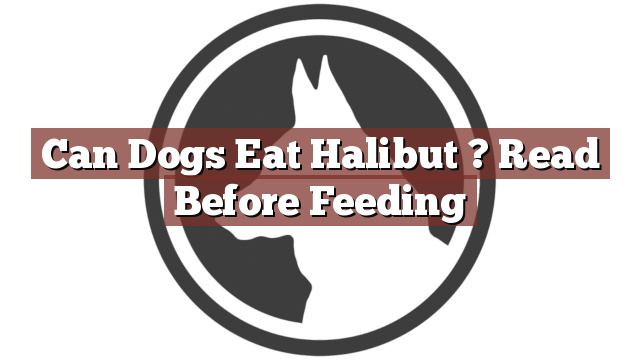Understanding Your Dog’s Dietary Needs
As responsible pet owners, it is crucial to understand our dogs’ dietary needs to ensure their overall health and well-being. While dogs are omnivores, their digestive systems are not built to handle certain types of food that humans commonly consume. It is essential to be aware of what is safe and healthy for our canine companions to eat.
Can Dogs Eat Halibut? Read Before Feeding
Can dogs eat halibut? This is a question that often arises when considering whether to share our meals with our furry friends. Halibut is a type of fish that is popular in many cuisines and is known for its rich flavor and nutritional benefits. However, it is important to exercise caution before feeding halibut to your dog.
The answer is yes, dogs can eat halibut, but it should be done with caution and moderation. Halibut is a lean fish that is packed with protein, omega-3 fatty acids, and essential vitamins and minerals. These nutrients can contribute to a healthy coat, skin, and immune system in dogs. However, it is crucial to ensure that the halibut is cooked thoroughly and served plain, without any added seasonings, herbs, or spices. Additionally, any bones should be removed to prevent choking hazards or internal injuries.
Pros and Cons of Feeding Halibut to Dogs
Feeding halibut to your dog comes with its own set of pros and cons. Let’s explore them:
Pros:
-
Nutritional benefits: Halibut contains high-quality protein, which is essential for muscle development and repair in dogs. It is also a good source of omega-3 fatty acids, which can benefit the immune system, joints, and overall well-being of your dog.
-
Variety in diet: Offering halibut as an occasional treat can add variety to your dog’s diet and prevent boredom. It can be a healthy alternative to traditional dog treats.
Cons:
-
Mercury content: Halibut, like many other fish, can contain mercury. High levels of mercury can be harmful to dogs, especially if consumed regularly or in large quantities. It is important to check the quality and source of the fish to minimize the risk of mercury contamination.
-
Potential allergies or sensitivities: Some dogs may be allergic or sensitive to fish. If your dog has never had fish before, it is advisable to introduce it slowly and monitor for any adverse reactions such as upset stomach, vomiting, diarrhea, or skin irritations.
In Conclusion: Weighing the Factors for Feeding Halibut to Your Dog
In conclusion, while dogs can eat halibut, it is important to consider the potential risks and benefits before incorporating it into their diet. If you decide to offer halibut to your dog, ensure it is thoroughly cooked, boneless, and served in moderation. Always consult with your veterinarian before making any significant changes to your dog’s diet, especially if your dog has any underlying health conditions or dietary restrictions.
Remember, a well-balanced and nutritionally complete diet tailored to your dog’s specific needs is the key to maintaining their optimal health and happiness.
Thank you for taking the time to read through our exploration of [page_title]. As every dog lover knows, our furry friends have unique dietary needs and responses, often varying from one canine to another. This is why it's paramount to approach any changes in their diet with caution and knowledge.
Before introducing any new treats or making alterations to your dog's diet based on our insights, it's crucial to consult with a veterinarian about [page_title]. Their expertise ensures that the choices you make are well-suited to your particular pet's health and well-being.
Even seemingly harmless foods can sometimes lead to allergic reactions or digestive issues, which is why monitoring your dog after introducing any new food item is essential.
The content provided here on [page_title] is crafted with care, thorough research, and a genuine love for dogs. Nevertheless, it serves as a general guideline and should not be considered a substitute for professional veterinary advice.
Always prioritize the expert insights of your veterinarian, and remember that the health and happiness of your furry companion come first.
May your journey with your pet continue to be filled with joy, love, and safe culinary adventures. Happy reading, and even happier snacking for your canine friend!

